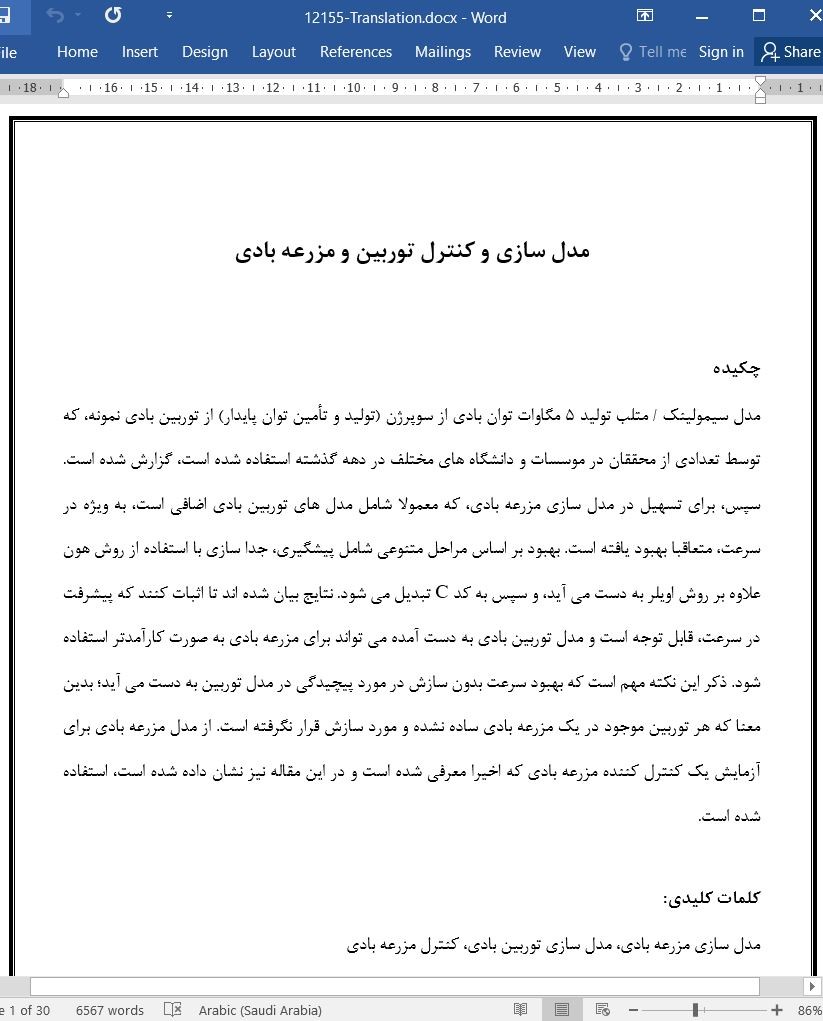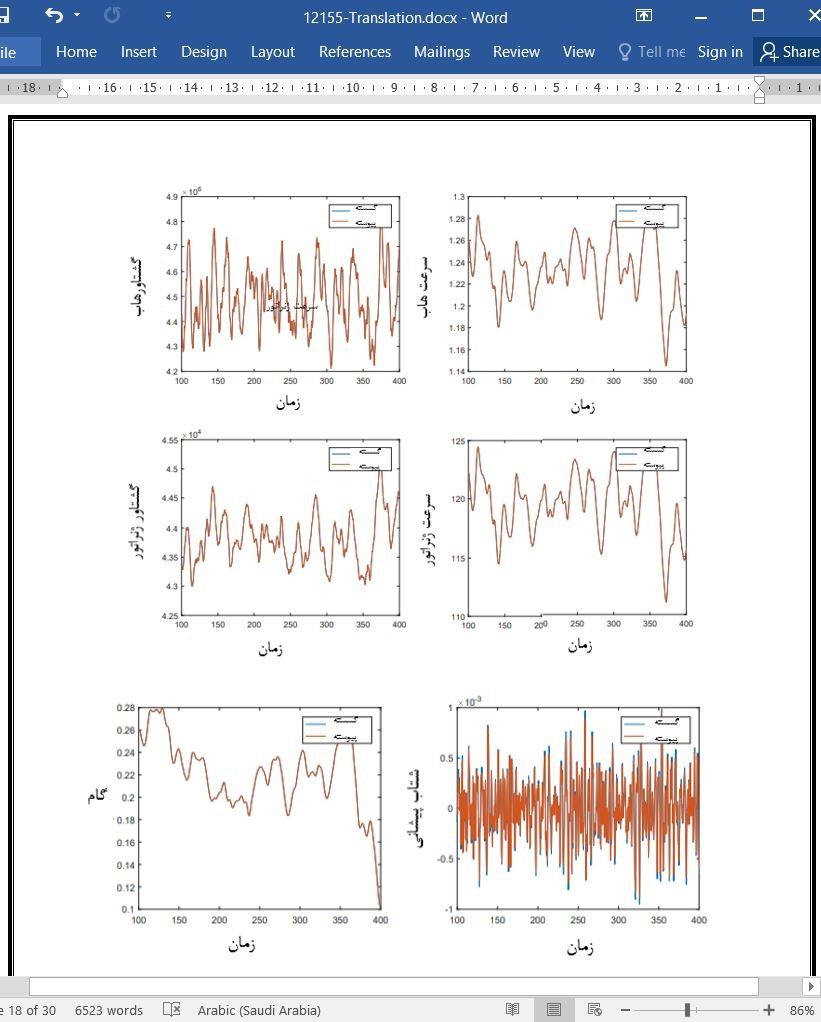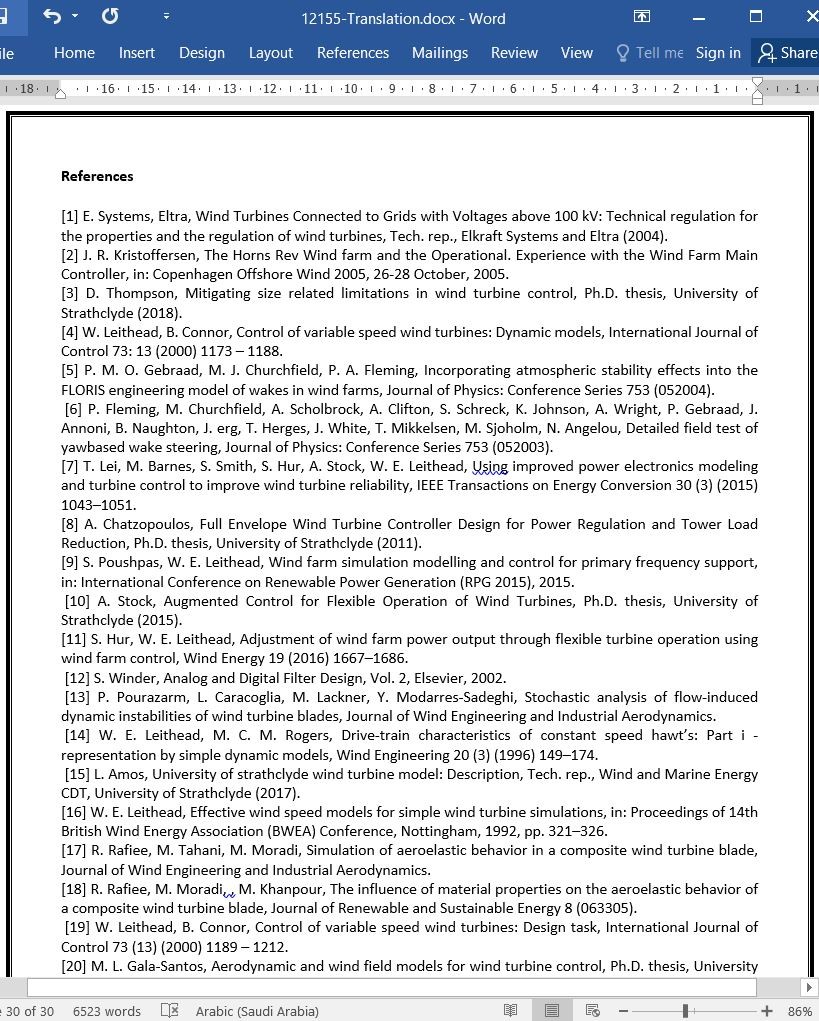
مدل سازی و کنترل توربین و مزرعه بادی
چکیده
مدل سیمولینک / متلب تولید 5 مگاوات توان بادی از سوپرژن (تولید و تأمین توان پایدار) از توربین بادی نمونه، که توسط تعدادی از محققان در موسسات و دانشگاه های مختلف در دهه گذشته استفاده شده است، گزارش شده است. سپس، برای تسهیل در مدل سازی مزرعه بادی، که معمولا شامل مدل های توربین بادی اضافی است، به ویژه در سرعت، متعاقبا بهبود یافته است. بهبود بر اساس مراحل متنوعی شامل پیشگیری، جدا سازی با استفاده از روش هون علاوه بر روش اویلر به دست می آید، و سپس به کد C تبدیل می شود. نتایج بیان شده اند تا اثبات کنند که پیشرفت در سرعت، قابل توجه است و مدل توربین بادی به دست آمده می تواند برای مزرعه بادی به صورت کارآمدتر استفاده شود. ذکر این نکته مهم است که بهبود سرعت بدون سازش در مورد پیچیدگی در مدل توربین به دست می آید؛ بدین معنا که هر توربین موجود در یک مزرعه بادی ساده نشده و مورد سازش قرار نگرفته است. از مدل مزرعه بادی برای آزمایش یک کنترل کننده مزرعه بادی که اخیرا معرفی شده است و در این مقاله نیز نشان داده شده است، استفاده شده است.
1. مقدمه
نشریه آماری 2016 توسط WindEurope گزارش داد که 1537 گیگاوات ظرفیت نصب شده توان بادی در اتحادیه اروپا قرار دارد. با این توان بالای باد، توان حاصل از مزارع بادی دیگر نمی تواند به سادگی از سرعت باد دیکته شود. توان مصرفی برخی از توربین های بادی در حال حاضر حذف شده است [1، 2]. فراهم آوردن خدمات برای مزارع بادی در مورد شبکه شامل رزرو چرخان، پشتیبانی فرکانسی و کمک توسط تطبیق عرضه – تقاضا لازم است، که می تواند با استفاده از یک کنترل کننده مزرعه بادی مناسب به دست آید. برای طراحی یک کنترل کننده مزرعه بادی، یک مدل مزرعه بادی اثربخش نیاز به توسعه دارد، که بتواند سریع اجرا شود و در عین حال جزئی باشد. این موضوع هدف اصلی کار ارائه شده در این مقاله است.
6. نتیجه گیری
مدل متلب از توربین بادی 5 مگاواتی سوپرژن نمونه که در دهه گذشته توسط محققان مختلف به کار گرفته شده است، به خصوص در ائتلاف بادی سوپرژن با سرعت بهبود یافته است. این بهبود به ترتیب از طریق پیشگیری، جداسازی و تبدیل به کد C به دست می آید. جداسازی به صورت بهینه مانع از استفاده از یکپارچه سازی عددی غیر بهینه حل کننده سیمولینک برای شبیه سازی ماژول تحریک سفت می شود و در نتیجه سرعت شبیه سازی را بهبود می بخشد. جداسازی پیش شرط اصلی برای تبدیل به کد C است. تبدیل مدل جدا شده به کد C و سپس به CMEX برای شبیه سازی در متلب / سیمولینک متعاقبا انجام می شود، که باعث بهبود بیشتر سرعت شبیه سازی می شود. این مورد به مدل گسسته اجازه می دهد که تکثیر شده و تعمیم یابد تا یک مدل مزرعه بادی را بدون افزایش زمان شبیه سازی به صورت نمایی بر خلاف مدل پیوسته اصلی شامل شود. نتایج شبیه سازی نشان می دهند که حتی با صد مدل توربین در یک مزرعه بادی، سرعت شبیه سازی در 70 ثانیه باقی می ماند. قابل تاکید است که مدل هر توربین ساده نشده است و تحت سازش قرار نگرفته است.
Abstract
The Matlab/Simulink model of the Supergen (Sustainable Power Generation and Supply) Wind 5 MW exemplar wind turbine, which has been employed by a number of researchers at various institutions and Universities over the last decade, is reported. It is subsequently improved, especially in speed, to facilitate wind farm modelling, which usually involves duplicating wind turbine models. The improvement is achieved through various stages, including prewarping, discretisation using Heun's method in addition to Euler method, and conversion to C. Results are presented to demonstrate that improvement in speed is significant and that the resulting wind turbine model can be used for wind farm modelling more efficiently. It is important to highlight that improvement in speed is achieved without compromising the complexity of the turbine model; that is, each turbine included in a wind farm is neither simplified nor compromised. The use of the wind farm model for testing a wind farm controller that has recently been introduced is also demonstrated.
1. Introduction
The 2016 statistic publication by WindEurope reports that there are 153.7 GW of installed wind energy capacity in the European Union. With such high penetration of wind power, the power generated by wind farms can no longer simply be that dictated by the wind speed. The power output of some wind turbines is already being curtailed [1, 2]. It will be necessary for wind farms to provide services to the grid including spinning reserve, frequency support and assistance with supply-demand matching, which could be achieved by the use of an appropriate wind farm controller. In order to design a wind farm controller, an efficient wind farm model, which can be executed fast and is detailed at the same time, needs to be developed – this is the main objective of the work presented in this paper.
6. Conclusions
The Matlab model of the Supergen Wind 5 MW exemplar wind turbine, which has been used by various researchers over the last decade, especially within the Supergen Wind Consortium is improved in speed. This is achieved through prewarping, discretisation and conversion to C in order. Discretising optimally prevents the Simulink solver from non-optimally performing numerical integration for simulating the stiff drive-train module, and thus improves the simulation speed. Discretisation is also an essential prerequisite for conversion to C. Subsequently converting the discretised model to C, and then to CMEX for simulation in Matlab/SIMULINK, further improves the simulation speed. It allows the discretised model to be duplicated and extended to constitute a wind farm model without increasing the simulation time exponentially in contrast to the original continuous model. The simulation results demonstrate that even with one hundred turbine models included in a wind farm, the simulation speed remains at 70s. It is important again to emphasise that each turbine model is neither simplified nor compromised.
چکیده
1. مقدمه
2. مدل توربین بادی
2-1. ماژول گام
2-2. ماژول آیرودینامیک
2-3. ماژول روتور
2-4. ماژول تحریک و برج
2-5. دینامیک های دیگر و کنترل کننده توربین
2-6. تایید اعتبار
3. جداسازی و تبدیل به کد C
3-1. جداسازی
3-2. پیشگیری
3-3. تبدیل به کد C
4. مدل مزرعه بادی
4-1. شرح مقدماتی نتایج
5- کنترل کننده مزرعه بادی
6. نتیجه گیری
منابع
Abstract
1. Introduction
2. conversion of the discretised model to C.
2.1. Pitch Module
2.2. Aerodynamics module
2.3. Rotor module
2.4. Drive-train and tower module
2.5. Other dynamics and the turbine controller
2.6. Validation
3. Discretisation and Conversion to C
3.1. Discretisation
3.2. Prewarping
3.3. Conversion to C
4. Wind Farm Model
4.1. Preliminary Description of Results
5. Wind Farm Controller
6. Conclusions
References
- اصل مقاله انگلیسی با فرمت ورد (word) با قابلیت ویرایش
- ترجمه فارسی مقاله با فرمت ورد (word) با قابلیت ویرایش، بدون آرم سایت ای ترجمه
- ترجمه فارسی مقاله با فرمت pdf، بدون آرم سایت ای ترجمه



